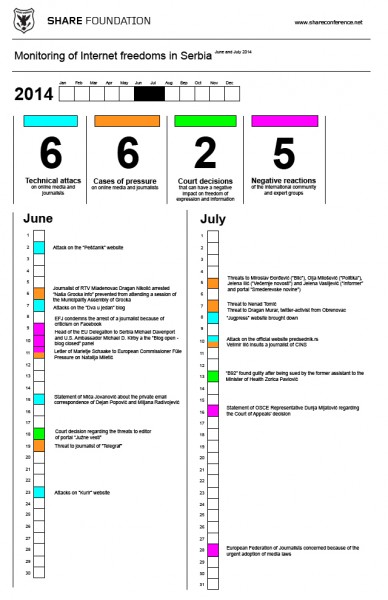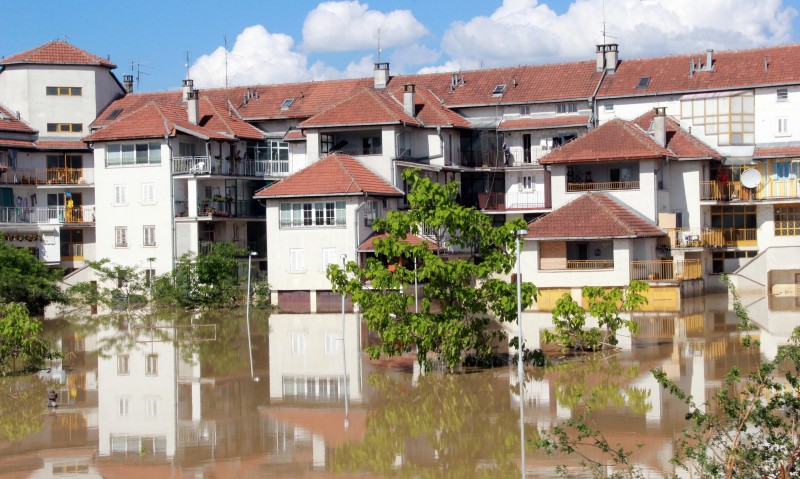There's a worrying trend in Serbia's digital world. Media websites are increasingly the target of mysterious technical attacks that render inaccessible certain politically sensitive content. The harassment of online journalists, including physical threats, is also rising.
In the wake of devastating floods that hit Serbia in May 2014, several local websites that published materials that criticized the government's relief efforts suffered technical attacks. Also, the whole blog section on a popular daily newspaper website was taken down after a satirical post by one of the bloggers. Some of the people who criticized the government's handling of the floods have also had unexpected visitors: police questioned a handful of citizens, on suspicion of “spreading panic” on social networks.

Monitoring of Internet freedoms in Serbia conducted by SHARE Foundation for June and July 2014. Image by SHARE Foundation.
The OSCE's representative on freedom of the media has expressed concern about the Web attacks and police actions, while the head of the EU Delegation and the US Ambassador in Serbia both called for greater respect of online free speech, joining a organized effort by bloggers and media representatives by local bloggers and media representatives. In a letter addressed to a European Commissioner, European MP Marietje Schaake also expressed concern about Internet censorship and pressures on the news media in Serbia.
The attacks that have rendered several Serbian websites inaccessible have relied mostly on distributed denial-of-service mechanisms. The website Peščanik, which publishes news and opinion, allegedly suffered a DDoS attack in June 2014, after posting articles claiming that Serbia's Internal Affairs minister plagiarized his dissertation. Around that time, another Peščanik exposé revealed that the former rector of a well-known private university in Serbia lied about having a doctorate from a London university. One of the authors who worked on these stories says malicious hackers accessed her personal emails. The newspaper Kurir has faced similar problems online, where DDoS attacks have brought down the site more than once—most recently on August 10.
Attacks on news portals are nothing particularly new in Serbia, where the prime minister's political party holds an absolute majority in the current government. In the past, the regime has tried to stifle the independent media, especially during the last election cycle earlier this year. In December 2013, for instance, the website of the Center for Investigative Journalism of Serbia (CINS) was hacked after it published a story about self-censorship in the Serbian online media. CINS suffered similar attacks again in February 2014.
Individual journalists have also faced greater pressures, especially in smaller cities, where reporters and citizen journalists are often at the mercy of “local lords”. In June this year, the Serbian prime minister and German chancellor held a joint press conference in Berlin. Natalija Miletić, a journalist working in Germany, asked about alleged media censorship in Serbia and academic plagiarism by high-ranking officials in the Serbian government. Miletić didn't get an answer, but the Serbian embassy in Berlin soon let her know that she'd not be welcome at future press conferences.
In another nasty episode, Serbia's Emergency Situations minister insulted a CINS journalist when the reporter called to verify certain information for a story. The minister later apologized and tried sending roses as a peace offering, but the flowers came back return-to-sender.
Also this summer, Serbian police arrested an RTV Mladenovac journalist for a Facebook post that allegedly “damaged the reputation” of a high-ranking official in the ruling Serbian Progressive Party. A hotel owner threatened the proprietor and editor of a news portal in Ruma, and a city official in Smederevo accused several journalists of spreading false information on Facebook, going so far as to leave threatening comments and even a menacing picture of the Grim Reaper on his personal page.
These cases and other incidents documented by SHARE Foundation suggest that the state of free speech in Serbia's media space should be a growing concern. If online commentary by journalists and ordinary citizens is any metric, the Serbian government's response to the summer's floods has room for improvement. Unfortunately, rather than address its own failings, the state has discouraged free expression on the Internet and turned a blind eye to violations of digital rights and freedoms.
Things could soon get better in Serbia, however, as the country recently adopted new media laws that leave digital media out of the regulatory scope, while still providing certain registration options that grant online media outfits the privileges of traditional media.









3 comments